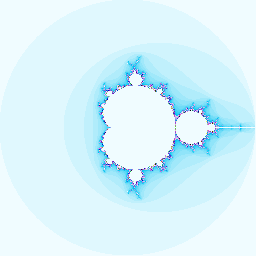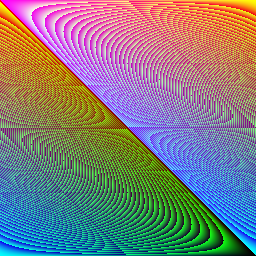 Coffee Space
Coffee Space 

These programs have been designed to be written on the back of a business card, with their output displayed on the front.
The following is the limitations on the design:
There are the following assumptions that are reasonable to make:

0001 #include<stdio.h>/*gcc a.c; ./a.out; eog b.ppm*/
0002 main(){int w=256,h=256,k;FILE*f=fopen("b.ppm","w");fprintf(f,"P6\n%d %d\n255\n"
0003 ,w,h);for(;--h>=0;){for(k=w;k>=0;--k){char c[3]={h%256,(k*h)%256,k%256};fwrite(
0004 c,1,3,f);}}fclose(f);}/*coffeespace.org.uk*/
To compile:
0005 gcc a.c
To run:
0006 ./a.out
To view:
0007 eog b.ppm

0008 #include<stdio.h>
0009 main(){int k=256,w,h=k,x,a=k/2;double b=a/2,i,j,y,z,t;FILE*f=fopen("b.ppm","w")
0010 ;fprintf(f,"P6\n%d %d\n255\n",k,k);for(;h--;)for(w=k;w--;){i=j=0;y=(w-a)/b;z=(h
0011 -a)/b;x=k;for(;i*i+j*j<4&&x--;){t=i*i-j*j+y;j=2*i*j+z;i=t;}char c[3]={x<<4,x<<2
0012 ,x};fwrite(c,1,3,f);}fclose(f);}
To compile:
0013 gcc a.c
To run:
0014 ./a.out
To view:
0015 eog b.ppm
The image produced is really good looking and well detailed with
k = 256^X where X is greater than 1. It has
been tested with k = 2^14 = 16385, on a 3rd generation i5
processor, taking about 3 or 4 hours. This program certainly comes under
the category of “embarrassingly parallel” and could benefit from
multi-core processing, as little RAM and disk speed is used and pixels
can be calculated independently.
FILE_1 (t1.txt)
0016 Hello World! 0017 1234567890 0018 Difference 0019 0123456789 0020 hello
FILE_2 (t2.txt)
0021 Hello World! 0022 1234567890 0023 difference 0024 9876543210 0025 hello 0026 extra
Output
0027 [0003] 0028 t1.txt 0029 Difference 0030 0031 t2.txt 0032 difference 0033 0034 [0004] 0035 t1.txt 0036 0123456789 0037 0038 t2.txt 0039 9876543210 0040 0041 [0006] 0042 t2.txt 0043 extra
0044 #include<stdio.h>
0045 main(int c,char**v){int n=512,i=1,j,d=i,e=i;char a[n];char b[n];FILE*y=fopen(v[
0046 1],"r");FILE*z=fopen(v[2],"r");for(;d&&e;++i){d=fgets(a,n,y);e=fgets(b,n,z);for
0047 (j=-1;++j<n&&a[j]==b[j];)if(a[j]==0)j=n;if(j<n){char c[7]={'[',(i/1000)+48,(i/
0048 100%10)+48,(i/10%10)+48,(i%10)+48,']',0};puts(c);if(d){puts(v[1]);puts(a);}if(e
0049 ){puts(v[2]);puts(b);}}}fclose(y);fclose(z);}
To compile:
0050 gcc a.c
To run:
0051 ./a.out FILE_1 FILE_2
To view, read the terminal output.
This program is limited to a difference check of 9999 lines, after which the line numbering goes out of the window but it continues to check. This program simply checks the lines, one after another and checks whether they are the same or not. It’s particularly useful if you need to check for a difference in a log for example, or a revision to a simple text file somebody has made.
Comments
This program scales well by changing what
wandhequal, which are width and height respectively. Numbers that reflect2^Xdisplay nicer than others.